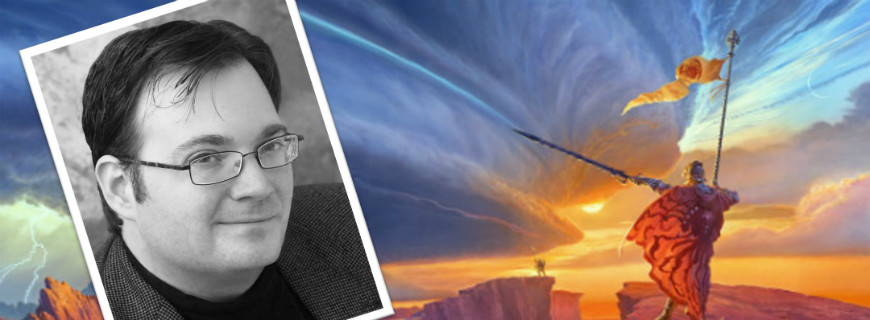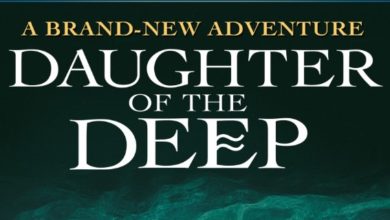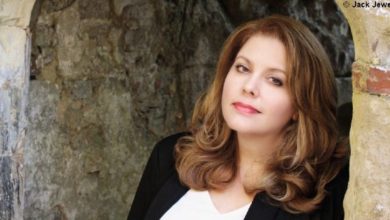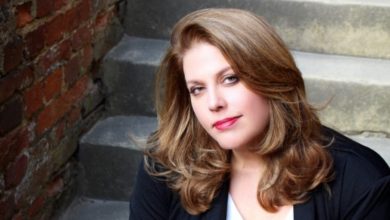Interview with Brandon Sanderson

Brandon Sanderson, the creative mind behind fantasy book series like Elantris, Mistborn, Steelheart and Alcatraz, made a virtual visit to SFF Planet, and talked with us about the best topic in the world – BOOKS!
So, without further ado, hello Mr. Sanderson, and thank you for agreeing to have this interview. Here are a few questions our fans wanted to have answered:
What place does religion have in your life compared to its role in your books? For example the role of religious authorities in Elantris is not very positive.
Being religious myself, I find that the different ways people interact with religion to be fascinating. So it comes up in my books time and time again, as I try to explore how different people see the world, and their own relationship to diety.
In Elantris specifically, I came up with the idea of the antagonist (who is an aggressive missionary) while I myself was serving as a missionary for the LDS church. I saw the different ways that different religions approached teaching, and decided that the most evil thing I could imagine at the time was someone using religion for nefarious purposes. But that’s always how it is—good things turned evil are often far more dark than something that never had any hint of good to it.
A little morbid question if you will – has finishing The Wheel of Time for Robert Jordan effected the way you write or approach books and book series? Do you ever think about what will happen if someone else will have to finish your books?
I have thought about this—and doing the Wheel of Time certainly is part of why I’ve had to confront it. I do feel that I need to make an effort to be certain my notes are in order, that a series could be finished for me if I weren’t to be able to do so myself. But I probably would only want this to happen if the series is far enough along that it’s reasonable to have it finished.
But yes, I’ve thought about it.
In the recent past, books about super-powered human beings, originally a very visual genre, have become popular. Why do you think that is? What prompted you to start writing a world with super-powered people, yourself?
I’m not sure I can speak for the movement as a whole, but for me, most books I write come because I sense some hole in the stories around me. I find something that isn’t being written, or a story that isn’t being told, and feel like I can add something to the discussion.
That means that naturally, the things I’m experiencing have a big effect on me. If I read a lot of YA books in a row, I’ll notice trends and want to buck them or try to go the other direction. If I read a lot of comics, I’ll ask what they aren’t doing, and will naturally start writing a story in my head to fill that hole.
Steelheart happened for this reason, where I was very intrigued by the idea of a world where selfish people started gaining super powers.
Do you plan to add other series to the Cosmere universe, on top of the existing ones (Stormlight, Elantris, Mistborn, Warbreaker)?
Dragonsteel will be the story of how the Cosmere began, and is a series. I’m unlikely to do other big series, as the core stories are the ones you’ve mentioned (plus Dragonsteel). But we shall see. There’s one small cycle on Threnody I’ve been contemplating that might end up as a series.
Will we see “cross-over” books between series in the Cosmere universe?
The further we get in the mega-series, the more crossover you’ll see. But it won’t come to the forefront until I do the science fiction Mistborn books, which is a good decade off.
In a recent article, author Ann Bauer urged authors to disclose where their income truly comes from, and stop misleading beginning authors into guilt for not managing to sustain themselves from their writing. What are your thoughts about writing and the challenges of doing it full time? Is it even possible these days?
This is a very interesting article, and I like much of what Ms. Bauer said. We DO often ignore speaking of the privilege that makes us able to write as we do. I come from a family with parents who were always involved in my schooling, who emphasized the importance of a college education, and who gave me a springboard toward life. The knowledge and confidence that I COULD succeed is, perhaps, the greatest privilege my upbringing gave me.
However, I think that Ms. Bauer ignores the fact that most writers are not actually people living in Manhattan, going to Ivy League schools, or taking ten years to write their novels. Most writers I know and have met (granted, she and I move in different circles, obviously) have far more workmanlike lives than that. They’re writing during some combination of lunch breaks, evenings, and while their kids are at school. They are artists when writing, as we all are, but are approaching their careers with a businesslike mind-set.
It’s perfectly possible to make a living as a writer these days–and I know a large number of people who do it. Their incomes may not be glamorous, and they might not live in great apartments in the city, but they make enough to get by on. I don’t mean that authors should feel guilty if they can’t make enough to live on, but I also do think that this can be a more realistic career than Ms. Bauer expresses.
That said, I did have to spend my twenties (before I was published) working a hotel desk job overnight, where I could write at work. (Allowing me to have a full-time job and write full time.) This did play a little havoc with my social life, but once I sold a novel, I was able to transition to writing full time during the day within about three years. Since then I have had more than enough to sustain myself and my family on the writing income. But I will quickly admit that my experience is not typical, and the life of a bestselling author can be very different from a midlister.
So yes, I think it’s good to be up-front about these things. The romantic life of an author in an expensive, big-city apartment, laboring on a perfect book for a decade or more might be something that doesn’t exist except for those without some kind of subsidy. But don’t forget that it’s possible to have a different, less glamorous lifestyle and still be a writer.
Thank you very much for your time! You definitely gave all of us, readers and writers alike some food for thought. Keep writing awesome books, and we hope we will get to do this again in the future.
If you liked this interview and want to learn more about Brandon Sanderson and his work, head over to his website, which is filled to the brim with awesome content like information on upcoming books, first chapters, art gallery and much more!




